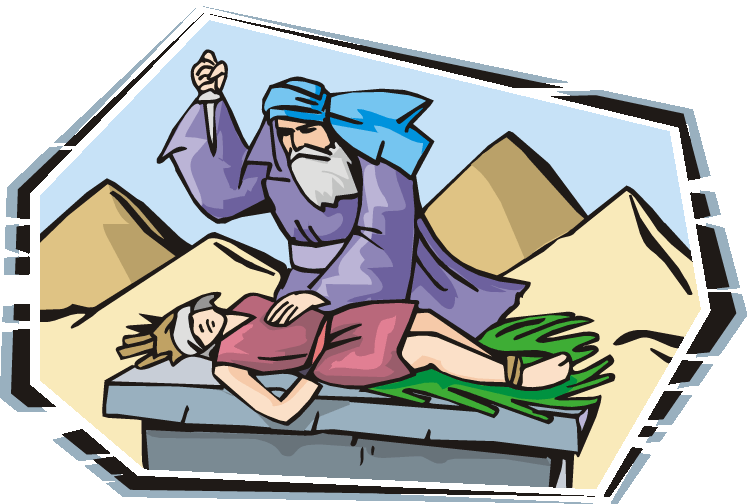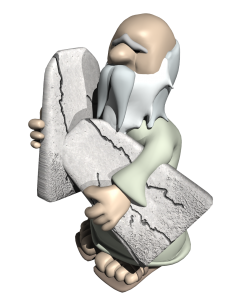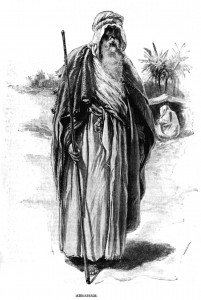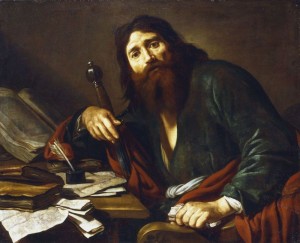A Vision of the New Covenant
In Genesis 15:17–18fp, we read,
And it came to pass, that, when the sun went down, and it was dark, behold a smoking furnace, and a burning lamp that passed between those pieces. In the same day YHVH made a covenant with Abram …
What is the meaning of this? This is nothing other than YHVH giving Abraham a prophetic vision of Yeshua the Redeemer of Israel dying on the cross paying for the sins of Abraham’s descendants who would break that very covenant that YHVH made with Abraham on that day. Both Jewish and Christian biblical commentators recognize aspects of this truth.
Let’s first establish that YHVH passed through the pieces of sacrificed animal. Rashi, the medieval Jewish Torah scholar, recognizes that the Divine Presence was the one who passed through the pieces of animal while Abraham slept (Rashi’s commentary on Gen 15:10). Furthermore, the ArtScroll Tanach Series Bereishis/Genesis Commentary, vol 1a, states, “The smoke [which rose up into the thick darkness (Radak)] was the ‘Cloud and thick darkness’ which appeared at the revelation of the Torah and the torch in its midst was ‘the fire’ which appeared at Sinai [see Exod 19:18; Deut 5:4]”…. [Elohim] caused His Presence, symbolized by the fire, to pass through and conclude the Covenant.… [T]he culmination of this vision was that the fire consumed the pieces, causing their smoke to ascend to heaven…” (p. 534–535). Christian commentators Keil and Delitzsch in their commentary on this passage state, “In this symbol [i.e., the smoking pot and the fiery torch], Jehovah manifested Himself to Abram, just as He afterwards did to the people of Israel in the pillar of cloud and fire” (Hendrickson, p. 138). So both notable Jewish and Christian scholars relate the smoke and the fire Abraham saw pass between the pieces of meat to YHVH’s Presence in the cloud and pillar of fire that led Israel in the wilderness. We read in Exodus 13:21,
And YHVH went before them by day in a pillar of a cloud, to lead them the way; and by night in a pillar of fire, to give them light; to go by day and night.
Then in Exodus 14:19 it is written:
And the angel of Elohim, which went before the camp of Israel, removed and went behind them; and the pillar of the cloud went from before their face, and stood behind them.
Who is this “Angel” of Elohim (in other places: he is called “the Angel” of YHVH)? Angel is an unfortunate translation. The Hebrew word for angel is malak (מלאך) and simply means a heavenly or a human messenger. Prophetically this word can refer to human messengers such as the one coming in the spirit of Elijah prior to Messiah’s coming, as well as to the Messiah himself (“Messenger/Malak of the covenant” in Malachi 3:1). In Genesis 32:22–30, Jacob wrestles with a man the Scriptures identify as the Malak of YHVH (Hos 12:3–5) and whom Jacob called Elohim (verse 30). This same Individual redeemed Jacob (Gen 48:18) and is identified with the Malak of Elohim … the Elohim of Bethel (Gen 31:11 and 13), and appeared to Moses at the burning bush (Exod 3:2). Now this same Entity is leading Israel in the wilderness. Again who is he? Stephen in Acts 7:37-39 identifies the Messiah (i.e. “that Prophet” Moses mentioned in Deut 18:15) with the “Angel” or Heavenly Messenger which spoke to the children of Israel from Mount Sinai and who gave them the “living oracles,” who the Israelites later rejected for pagan gods. Paul elsewhere said of that same Personage that the Israelites did “all drink the same spiritual drink: for they drank of that spiritual Rock that followed them: and that Rock was Messiah” (1 Cor 10:4).
Of that pillar of fire that led them, we see that it gave them light, we know that light, in the Scriptures, is synonymous with YHVH’s Torah (e.g., Prov 6:23). Additionally, we know that Yeshua the Messiah is the Light of the World — the Word of Elohim in living form (personified) (John 1:1–14).
So, the pre-incarnate Yeshua, in passing through the pieces of meat, ratified the Abrahamic Covenant. He accepted the offering as it went up to heaven in a cloud of smoke even as fire came forth from the same cloud in the Holy of Holies in the Tabernacle and the same pre-incarnate Yeshua accepted the first sacrifice on the Altar of Sacrifice (Lev 9:24, see also Judges 6:20–21; 13:19–20).
But there is more. Continue reading →







